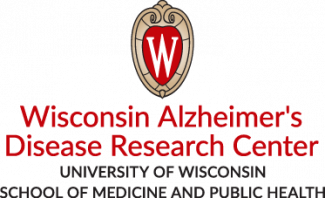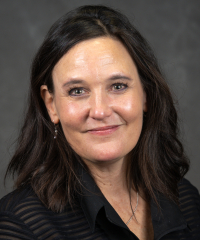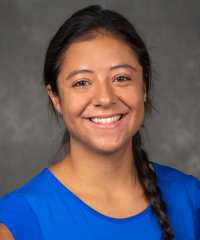
Several members of the Gleason Lab, led by Carey Gleason, PhD, will present abstracts at the 2019 Alzheimer's Association International Conference (AAIC) in Los Angeles, California, July 14-18. The following is a list of Gleason Lab presenters and links to their abstracts. Click on the presentation title to access a PDF of each abstract.
Carey Gleason, PhD
Improving Dementia Outcomes in Indian Country: The Oneida Nation Alzheimer’s Disease Project

Biography
Carey Gleason, PhD, is a scientist and clinician whose research interests stem from her desire to improve diagnosis and treatment of Alzheimer’s disease (AD) and dementia for all individuals including women, African Americans and other groups traditionally under-represented in research. Her research program in AD has two major foci: (1) the cognitive effects of estrogens and estrogenic compounds, and (2) Health Disparities in AD. The belief that research discoveries should benefit all groups unifies seemingly disparate lines of scientific inquiry. Presently, Dr. Gleason serves as Leader of the Inclusion of Under-Represented Groups Core of the Wisconsin Alzheimer’s Disease Research Center and is principal investigator (PI) for the NIH/NIA-funded African Americans Fighting Alzheimer’s in Midlife (AA-FAiM; R01 AG054059) study. She is co-PI for the KEEPS Continuation study, also funded by the NIH/NIA (RF1 AG057547), and hopes to continue adding to our understanding of the relationship between hormones and brain health.
Adrienne Johnson, PhD

Biography
Adrienne Johnson, PhD, is a postdoctoral fellow at the UW Center for Tobacco Research and Intervention (UW-CTRI) and the William S. Middleton Memorial Veteran’s Hospital, supported by a VA Advanced Fellowship in Women’s Health. Johnson received her bachelor’s degree in psychology and philosophy from UW. She then worked for two years at UW-CTRI as a health counselor. Using skills she learned while working as a health counselor, Johnson went on to obtain her PhD in clinical psychology from the University of Cincinnati, with a focus in health psychology. She completed her pre-doctoral clinical internship at the Baylor College of Medicine in Houston. She is interested in conducting two interrelated lines of research. The first line of research will examine cognitive-affective factors (i.e., emotion dysregulation, distress tolerance, anxiety sensitivity) that may impede smoking-cessation efforts among individuals with anxiety psychopathology, neurological disorders, and women. Building on the theoretical framework from this first line of work, her second line of research will focus on developing and evaluating targeted cessation treatments for these difficult-to-treat smokers. This research will utilize principles from implementation science in order to address issues of reach (i.e., participation rate of the targeted population), implementation (i.e., intervention integrity and quality), and adoption (i.e., system-level factors associated with intervention use) in medical settings to decrease the delay from scientific testing to treatment delivery for these special populations.
Nick Lambrou, PhD

Biography
Nickolas H. Lambrou, PhD, is an advanced postdoctoral fellow with the Madison VA Geriatric Research Education and Clinical Center (GRECC), where he studies under the mentorship of Carey E. Gleason, PhD. His research endeavors address relationships between identity development, stress and resilience, social determinants of health, and cognition across the lifespan within underserved populations.
Carrie Trojanczyk, BA
Lessons from a Research Collaboration with the Oneida Nation of Wisconsin

Biography
My name is Carrie Trojanczyk and I am originally from Rochester, NY, where I graduated from the University of Rochester with a BA in Public Health. I am currently a Research Specialist/Study Coordinator with the Wisconsin Alzheimer’s Disease Research Center and the Wisconsin Alzheimer's Institute. My position aims to increase diversity and inclusion of underrepresented groups in Alzheimer's research.
Mary Wyman, PhD
Perspectives of Mental Health Providers on Working with Patients with Dementia and Their Caregivers

Biography
Dr. Wyman trained as a clinical geropsychologist at Indiana University and the University of California-San Francisco before starting at the W.S. Middleton Memorial Veterans Hospital and University of Wisconsin-Madison. She joined the Gleason Lab in 2016 with research interests focused on neuropsychiatric symptoms in dementia, patient-provider-caregiver interactions in geriatric care, and improving mental health care quality and access for older adults with cognitive loss. She leads the Dementia Friendly Hospital initiative at the Veterans Hospital, which has attracted national attention as an innovative approach to improving the health care experience for persons with dementia and their caregivers.
Megan Zuelsdorff, PhD

Biography
Dr. Megan Zuelsdorff is a public health researcher and an epidemiologist focused on social determinants of health and aging. She is the Principal Investigator of the Stress and Resilience in Dementia (STRIDE) study and a Research Scientist in the Gleason Lab. Dr. Zuelsdorff is interested in understanding the effects of stress on the body and brain. She is studying ways in which adversity across the lifespan affects stress hormone levels and cognitive health, and seeking to identify individual and community characteristics that build resilience and buffer those negative effects.
- Log in to post comments



